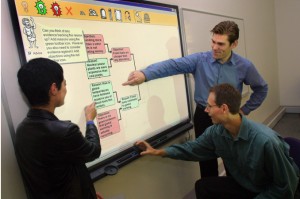Critical thinking is the skill of clear reasoning. Whenever we put forward an argument or try to justify a view on any subject, reasoning is involved. Critical thinking is the skill of ensuring that the reasons you give to support a claim you make do actually support it, and of spotting the ways that reasons in arguments often do not fully support their conclusions.
As a field of study critical thinking is related to logic, which is the abstract study of the structure of argument. However, the vast majority of issues to do with reasoning are not questions of formal logic, because most of our reasoning in actual experience is formally invalid, inductive reasoning. Critical Thinking is engaged in the more practical, flesh-and-blood business of whether our messy, ambiguous, real arguments are more or less justified, rather than the neatness of formal logic. 
The development of critical thinking is crucial to the practice of the Middle Way. The Middle Way enables us to address conditions by avoiding the interpretation of our experience through metaphysical preconceptions. Very often those preconceptions become apparent through critical thinking as unjustified assumptions. We need a certain amount of awareness to become aware of a critical problem and apply thought to it, but critical thinking skills are then needed to identify what the unhelpful and unjustified assumptions are.
An example
Here is a simple example of an unjustified metaphysical assumption having an immediate impact and reducing moral awareness. Fred is committed member of a political party and believes completely in the truth of the founding principles of that party towards issues of personal freedom, the power of the state, economic policy etc. Bill is a friend of Fred who has not been politically active, but Fred convinces him to come along to a party meeting one day. Bill has an open mind and starts asking some difficult questions about certain policies and about the status of the party leader. Fred takes this as a personal attack and instead of discussing the issues he raised, has a row with Bill after the meeting. The friendship between the two subsequently ends.
Fred’s implicit reasoning goes something like this:
1. The party’s policy is correct
2. Anyone who questions a correct policy must be wrong
3. Bill has questioned a correct policy
4. Therefore, Bill’s questioning of party policy is wrong.
Here, he has assumed that anyone who questions a correct policy must be wrong to do so (2), which is not necessarily the case even if it is true that the party’s policy is correct. Fred could have quite consistently continued to believe in his party’s policy and yet considered the criticisms. Bill could also have been doing the party a favour by asking questions that might challenge it to improve either its policies or their presentation. Fred’s response, is, of course, a negative emotional reaction, and it could be considered and dealt with on that level. If Fred had simply been more aware he might also have been able to avoid this response. However, he also made a mistake which could have been identified in terms of critical thinking, which is that of assuming that (2) was true because (1) was true.
However, this mistake in critical thinking terms was also a philosophical mistake. The philosophical mistake was (1), the metaphysical belief that the party’s policy was absolutely correct, rather than being merely provisionally so. Given that no absolute truths can be gained through experience, in believing that the party’s policy is absolutely correct, Fred was making the mistake of adopting an absolute moral position on a dogmatic basis that goes beyond experience. It was the philosophical mistake in (1), that supported his critical thinking mistake in (2), because the acceptance of one dogmatic assumption makes it easier to make further dogmatic assumptions, even when they don’t necessarily follow. Similarly, the identification of dogmatic assumptions like (2) through critical thinking makes it easier to question the initial assumption (1) on more basic philosophical grounds.
Critical thinking and philosophy
Even if Fred had not questioned (1), he would still be making progress even if he had avoided assuming (2) and been open to discussing Bill’s questions. Thus those who are committed to metaphysical ideas can still practice critical thinking to a limited degree, and thus be less dogmatic than they would have been otherwise. However, skills of critical thinking do inevitably raise philosophical issues. We may identify that one claim does not necessarily follow from another one, but how do we know whether the initial claim is correct? The Middle Way goes further than critical thinking because it provides us with criteria for rejecting dogmatic claims on philosophical, moral and spiritual grounds.
For example, it would be possible to do some critical thinking whilst being a devout Roman Catholic and accepting the Pope’s authority. One could have the rigour of the Jesuits. However, the impossibility of questioning the founding dogma would continue to create strains in that critical thinking by imposing no-go areas. The same impulses towards widening awareness and open questioning that lead to critical thinking are also very likely to lead one into philosophical questions, and to the further dismantling of dogma.
Nevertheless, critical thinking is a good place to start, especially for the many people who are not yet ready to face up to all the dogmas in their lives philosophically. Anyone who studies and practises critical thinking is in effect beginning to practice the Middle Way and to address conditions more fully than they did before.
Podcast interview about Critical Thinking: Barry Daniel interviews Robert M Ellis:
